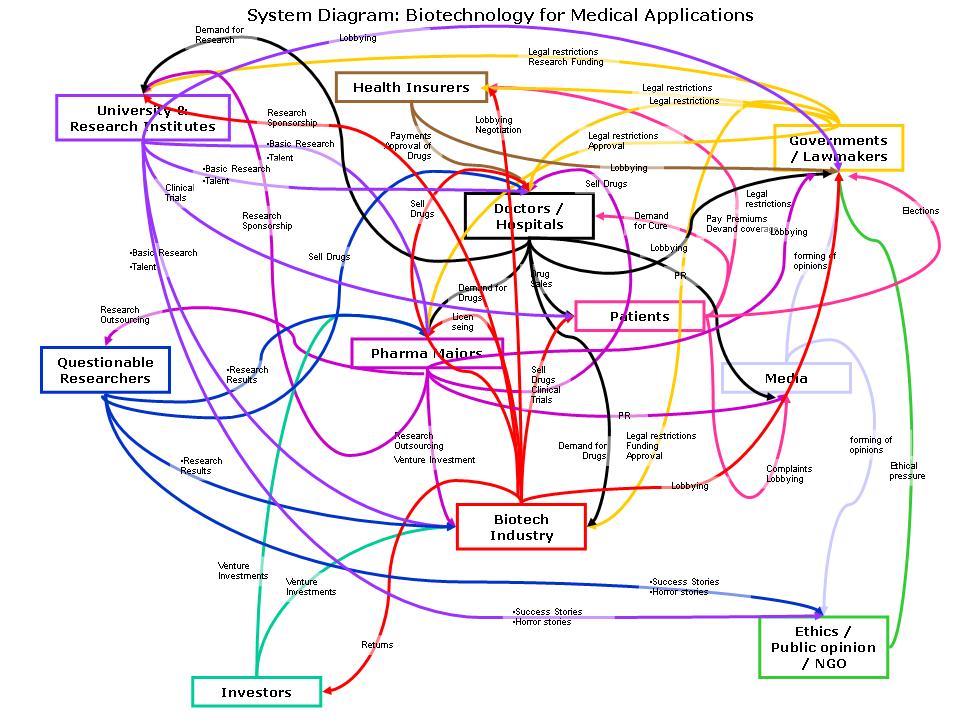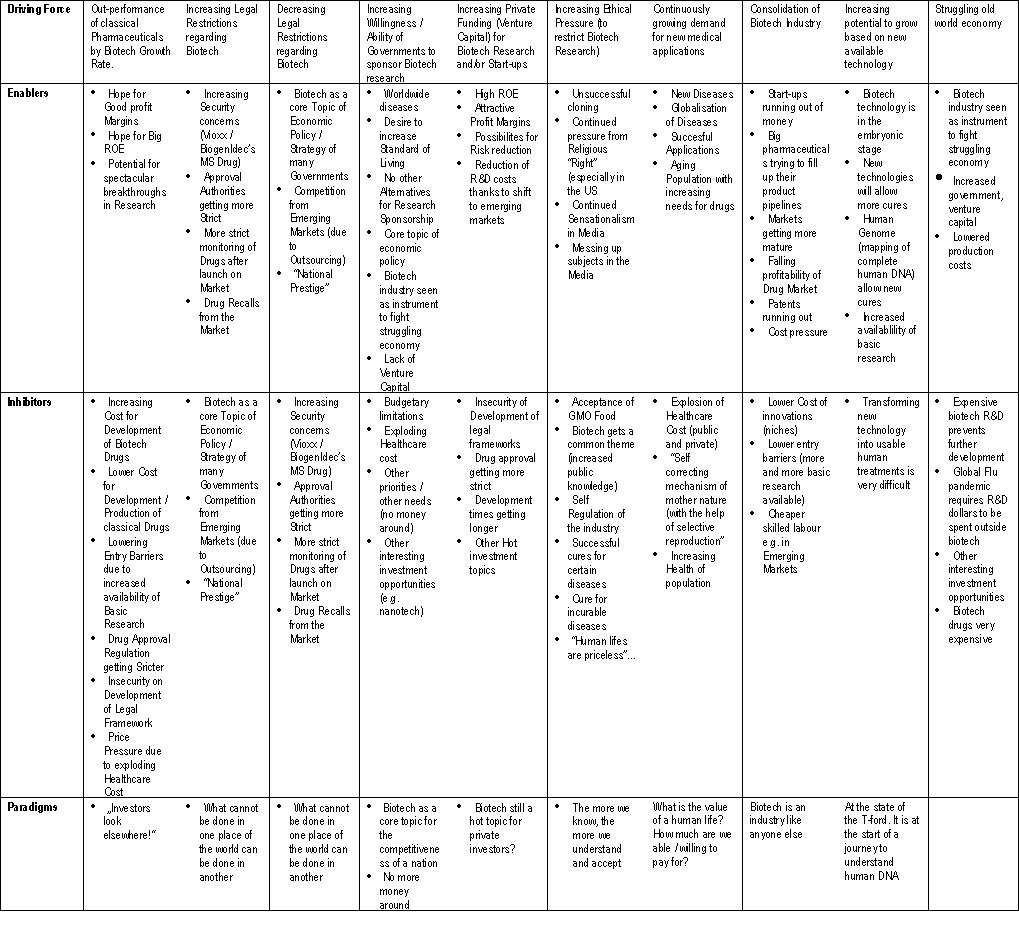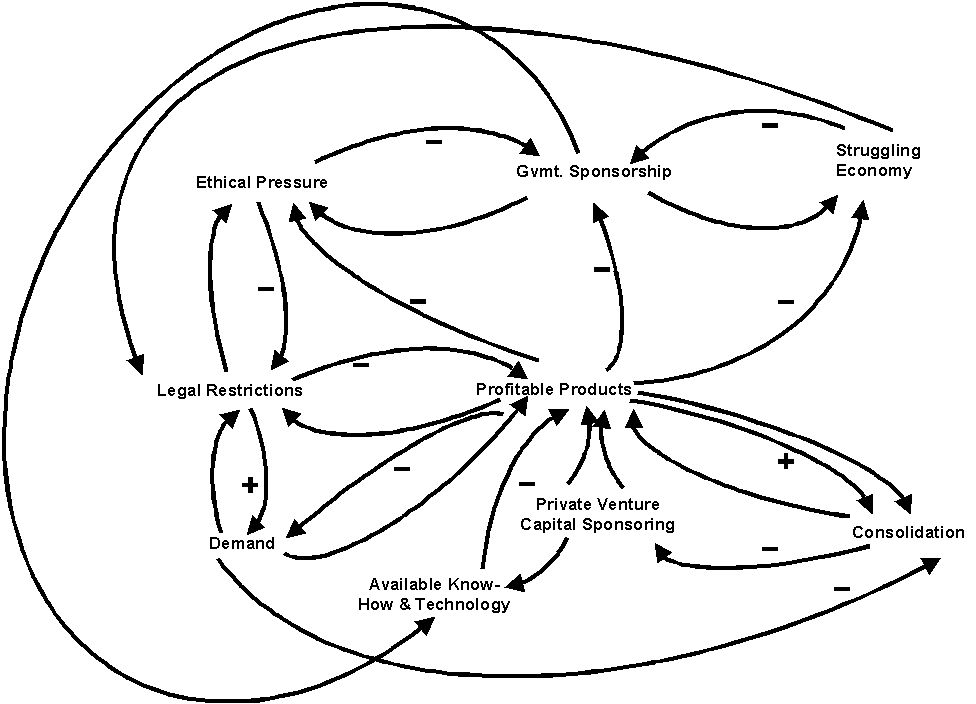The Future of Biotechnology for Medical Applications in 2015
Introduction
This page will contain the results of the scenario planning process of group 4 of class RSM EMBA05 on the following subject:
The Future of Biotechnology for medical applications 2015
Scenario Topic
Biotechnology seeks to treat or even cure: Cancer, AIDS, hemophilia, hepatitis, diabetes, growth failure, heart disease, dermatology and autoimmune disorders. Over the last 20 years the biotech industry has grown from virtually none existing to a large industry with the two largest players having a market value around the 100 billion US dollar mark making them leading stocks on the Nasdaq exchange.
A definition of biotechnology is "the commercial application of living organisms or their products, which involves the deliberate manipulation of their DNA molecules" This definition implies a set of laboratory techniques developed within the last 20 years that have been responsible for the tremendous scientific and commercial interest in biotechnology, the founding of many new companies, and the redirection of research efforts and financial resources among established companies and universities. These laboratory techniques provide scientists with a spectacular vision of the design and function of living organisms, and provide technologists in many fields with the tools to implement exciting commercial applications.” [1]
The strategic dilemma is where the biotechnology industry for medical applications is in the “industry life cycle”? Is the biotech industry going to keep showing a 30-50% growth rate per year in the next decennia or is the industry mature and will the growth be comparable with industries like CPG which grow rate is similar to parameters like the growth of the population, inflation or the GDP. Or, has the biotech industry reached its top and will the industry decline and perhaps disappear?
Research Questions
Ethics & public opinion (Mattias)
1. What are the ethical drivers to prevent biotechnology to further develop? (Will we allow the industry to clone sheep or will the conservative or religious point of view prevail which would handicap the industry to further grow)
2. What are the ethical drivers to further support or speed-up biotechnological development?
Ethics Drivers: US religious movements, propaganda, media attention, attention to "non ethical" invention
Answers are posted under Future of Biotechnology for Medical Applications in 2005, Ethics & public opinion
Growth / Development (Frans)
3. Is the recent growth of the cost for medical treatment sustainable? (The cost of health care insurance, which is directly linked to the cost of medicare, has grown about 10% annually partly caused by the growth of the biotech industry. This cost growth does not seem sustainable)
4. What percentile of the growth of medical treatment can be contributed to the biotechnolgy sector?
6. Has the industry reached its technological peak or has the biotechnological development just started?
7. Which new biotechnological developments are available?
21. Is there a substitute for biotechnology?
22. Are there other technological innovations in diverse fields which could attract investor attention much more than bio-technology?
25. Which diseases does bio-technology cure? What is the forecast of these diseases, expected to increase, stabilise etc?
26. What about the forecast of diseases in general? Are we expecting to see many more new diseases emerge like AIDS for example? Can Biotechnology be an answer?
27. What are the long term effects of genetically modified organisms on the environment and on human health?
28. Will biotechnological innovations in other fields like agriculture (GE crops) and materials negatively impact the image and sustainability of innovations in the medical applications field?
Growth / Development Drivers: cost of traditional medicine, decease applicability, substitutes, innovations, human health
Answers are posted under The Future of Biotechnology for Medical Applications in 2005, Growth/Development Issues
Governmental and Regulation Issues(Daniel)
5. What political developments occur that try to reduce the significant growth of healthcare cost?
8. How will the FDA and EMEA authorities respond to the exponential growth of the biotech industry and how will their guidelines develop?
18. What is the legal situation in those parts of the world which are relevant for biotech research?
19. To what degree can governments control on whether laws on biotech research are being respected?
32. Can the biotech development be stopped by imposing (general and international) laws?
Governmental / Legal Drivers: Legal situations, new imposed laws, government control, international common laws
Answers are posted under The Future of Biotechnology for Medical Applications in 2005, Governmental Issues
Financials (Krishna)
11.What percentage of the turnover of the pharmaceutical industry is generated by biotech drugs, what percentage is generated by classical drugs?
12. Profit margins of biotech drugs; Profit margins of “classical” drugs
29. Is/Can the cost structure of bio-pharmaceuticals structurally lower than that of ordinary pharmaceuticals?
Financial Drivers: Investments, Profit margins, cost structure, industry boom
Answers are posted under The Future of Biotechnology for Medical Applications in 2005, Biotech Financial
Market (Patrick)
13. What is the structure of biotech industry
- Major players
- Major research institutions
- Major investors
14. Which are the leading places in the world for biotech research for medical applications?
- Compagnies
- Universities and Research institutions?
15. Where (which applications) does R&D money currently flow to?
16. Which ones are currently the important fields of research? Which ones are currently ignored?
17. Which areas of the world are currently the leaders in biotech? Will these areas of the world also be the leaders in the future?
20. What is the state of the industry? Is there consolidation happening? Why?
23. Imagine there was no bio-technology today. How would the world look like? Is the size of the pie just as same/bigger than with bio-tech?
24. What are the annual forecasts of leading companies in the biotechnology sector looking like? Significant growth expected or tampering?
31. Will imposed (stricter) laws in one region (e.g. US) result in a move of R&D fund and expertise to other regions? Where?
33. What is the role of the traditional medicine industry? Are they lobbying against biotech-based medicine?
Market Drivers: Market players, Investors, Industry success, Center of competences, role of major medical companies
Answers are posted under The Future of Biotechnology for Medical Applications in 2005, Biotech Market
Out of scope?
9. How, if at all, could biotechnology be used in modern warefare?
10. What could be the consequences of the above question for medical apllications of biotechnology?
30. Can biotechnology alleviate poverty and hunger in developing nations?
Driving Forces
System Diagram
This is an extensive version of the system diagram which has been used as one base to derive the relevant research questions.

System Diagram: Biotech for Medical Applications: (select for larger image)
Simplified System Diagram
Based on the results of our research and the driving forces identified, the following simplified system diagram has been derived:
Usefull Links
http://www.wbcsd.ch/templates/TemplateWBCSD5/layout.asp?MenuID=1
http://www.lib.sfu.ca/researchhelp/subjectguides/bus/biotech.htm#12
http://www.bio.org/news/video/greatnewfrontier.asx
http://www.ey.com/global/content.nsf/US/Media_-_Release_-_06-01-05DC
http://biz.yahoo.com/ic/mva/biotrx.html
http://www.iisd.ca/sd/biotech/
http://www.nature.com/nbt/index.html
http://www.netsci.org/Resources/Financials/Biotech/group.html
http://www.burrillandco.com/bio/biotech_book

